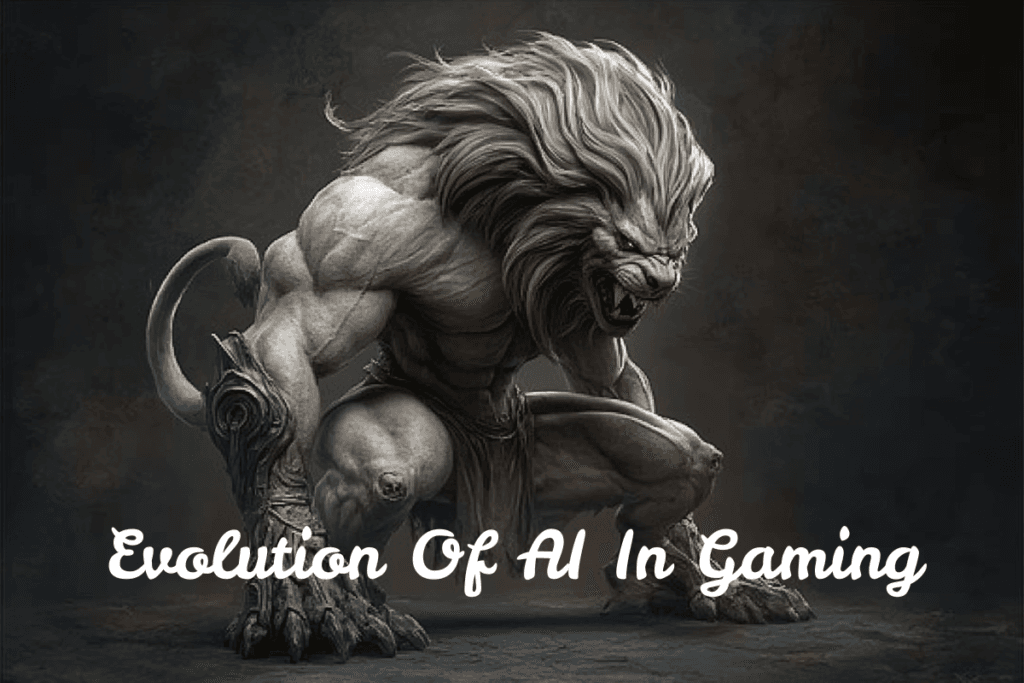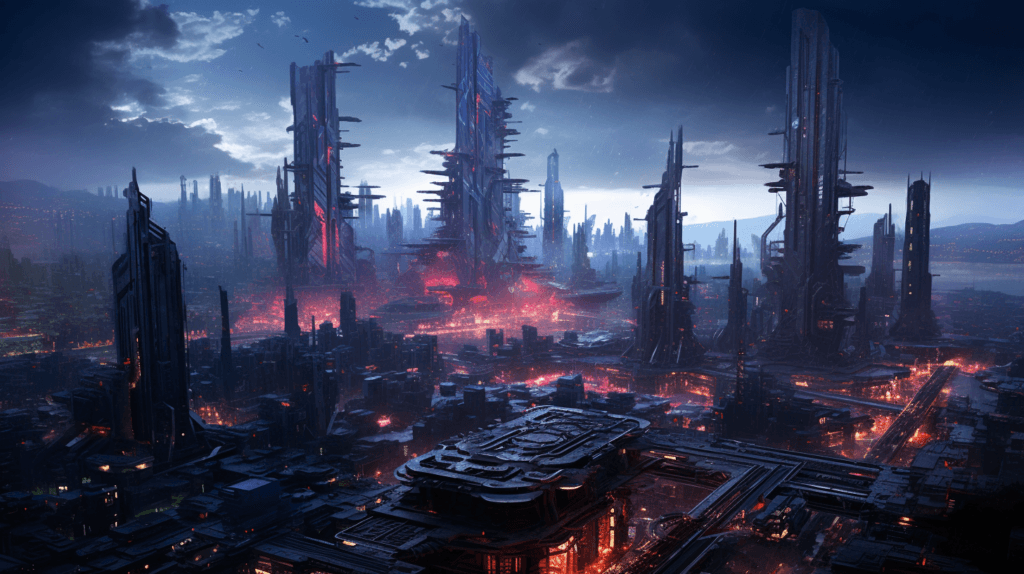A Deep Dive into the Evolution of AI in Gaming
Artificial Intelligence (AI) has drastically transformed the gaming landscape, unlocking possibilities that once seemed unattainable. What started as simple scripted behaviors has now evolved into adaptive and learning-driven enhancements, making video games more interactive, immersive, and intelligent. AI is currently undergoing a metamorphosis, fundamentally altering how games are played, developed, and experienced. Learn more about AI here.
From Humble Beginnings to Game-Changing Milestones
Initially, AI was primarily used to design predictable, rule-based adversaries. Classic games like Pac-Man featured enemy characters that followed set movement patterns, offering little to no adaptability. These early AI implementations laid the groundwork for game intelligence, but they lacked the complexity and realism that modern gamers expect.
AI advancement was restricted by hardware limitations, but as computational power increased, so did the potential for AI-driven gaming experiences, leading to several major milestones:
- Pathfinding algorithms like A* (A-star): Enabled AI-controlled characters to navigate game environments efficiently. Read about A* algorithm.
- Finite state machines (FSMs): Allowed NPCs to adjust behaviors dynamically.
- Machine learning (ML): ML models learn from data and adapt over time. This was demonstrated when Google’s DeepMind used reinforcement learning to master Atari games and defeat human champions in StarCraft II. Discover DeepMind’s AI research.
- Neural networks: Provided developers with tools to simulate human-like decision-making, leading to complex, unpredictable AI behaviors.
The Current Applications and the Expansive Influence of AI in Gaming
1. Procedural Content Generation (PCG)
AI now powers the creation of dynamic levels, vast worlds, and immersive narratives that evolve based on player choices. This ensures that each playthrough feels unique and unpredictable.
For example, No Man’s Sky uses AI-driven procedural generation to create a vast universe with billions of unique planets. Check out No Man’s Sky.
With AI advancements, procedural content generation can extend to story arcs, character dialogues, and even side quests, offering an almost infinite variety of experiences. Imagine an RPG where AI generates unique character backstories and relationships based on your in-game decisions, creating a truly tailored adventure.
2. Adaptive NPC Behavior
Today’s AI-powered NPCs dynamically adjust their strategies and reactions based on player actions, making gameplay more immersive and challenging.
Elden Ring features AI-driven enemies that adapt their combat strategies based on a player’s fighting style. Learn more about Elden Ring.
Future advancements could lead to NPCs with long-term memory, remembering past encounters and adjusting their behavior accordingly. This could revolutionize open-world gaming, making in-game interactions feel deeply personal and meaningful.
3. Personalized Player Experiences
AI is increasingly being used to tailor gameplay experiences to individual players. Games like Call of Duty and Apex Legends use AI to match players with others of similar skill levels. Visit Call of Duty.
AI can also analyze player behavior to modify in-game challenges dynamically. For instance, a game could assess whether a player struggles with a certain type of enemy and provide subtle assistance, such as better loot drops or strategic hints, without reducing the overall challenge.
4. AI-Assisted Game Development and Quality Assurance (QA)
AI is also streamlining game development by automating playtesting, detecting glitches, and refining balance adjustments before release. Ubisoft uses AI-powered tools to identify bugs and optimize gameplay. Explore Ubisoft’s AI initiatives.
As AI continues to evolve, it could assist with automatic voice acting, generating realistic character dialogues using AI-driven speech synthesis. This could allow developers to create vast, fully voiced open-world experiences without the need for extensive human voice acting.
The Exciting Future of AI in Gaming
The evolution of AI is just getting started, and the possibilities for the future are endless. From enhanced gameplay mechanics to entirely new ways of interacting with virtual environments, AI is set to revolutionize the gaming industry in ways we’re only beginning to imagine.
1. Innovative Gameplay Mechanics
Advanced technologies like neural networks and reinforcement learning are paving the way for ultra-realistic gameplay with an unparalleled depth of interaction. These technologies enable characters, systems, and environments to learn, adapt, and respond in real time.
- Prediction: Expect more games where characters and environments react organically to your choices, making each experience uniquely yours. For example, NPCs could remember past interactions and adjust their behavior, creating a dynamic and evolving world. AI could also create puzzles or challenges tailored to your skill level, ensuring a personalized experience for every player.
2. Immersive Environments
AI continues to enhance virtual reality (VR) and augmented reality (AR) through predictive modeling, smarter physics engines, and advanced lighting techniques. The result? Hyper-realistic environments that feel alive and responsive.
- Example: Imagine exploring a VR city where every NPC has a role, a routine, and a response to your actions. From shopkeepers who remember your purchases to pedestrians who react to your presence, the game world will feel more authentic than ever. AI will bring these immersive worlds closer to perfection, allowing for deeper explorations and interactions in both scripted and open-world settings.
3. Natural Language Processing (NLP)
Improved NLP will revolutionize storytelling and in-game dialogue, enabling characters to understand context and respond naturally to players. This advancement will make conversations feel less scripted and more organic.
- Application: AI-driven chatbots or virtual characters will allow you to have free-flowing, meaningful conversations, shaping the narrative based on your words. For example, you might interrogate a character in a mystery game, and based on your dialogue choices, they could reveal clues or lead you in a completely different direction. This creates a narrative that evolves uniquely for each player, making storytelling more engaging than ever.
4. Blockchain and AI Synergy
The integration of blockchain technology with AI will create decentralized, player-driven in-game economies. With AI-generated items, skins, or resources, players can trade, sell, or purchase assets on peer-to-peer platforms, adding a collaborative and entrepreneurial layer to gaming.
- Example: Imagine owning a rare item that was procedurally generated by AI and verified on the blockchain. You could sell this item to other players, creating a thriving virtual economy that feels tangible and valuable. AI could also create unique, one-of-a-kind collectibles, further boosting the personalization and monetization of gaming experiences.
5. Dynamic Difficulty Balancing
AI is also set to transform how games approach difficulty. Instead of static difficulty modes, future games will use AI to dynamically adjust challenges in real time, based on individual player performance.
- Impact: Gamers won’t have to choose between “too easy” or “too hard” settings anymore. AI will recognize when you’re struggling and subtly scale down the difficulty or, conversely, ramp up the challenge if it detects you’re breezing through. This adaptive approach keeps gameplay engaging for everyone, from casual players to hardcore enthusiasts.
The future of AI in gaming is filled with promise. By combining cutting-edge technologies with creative game design, developers will deliver experiences that are smarter, more immersive, and endlessly customizable. As AI continues to evolve, the only limit left may be the boundaries of our imagination.
Challenges and Ethical Considerations
While the potential of AI in games is undeniably exciting, there are critical hurdles that need to be addressed before its full benefits can be realized. These challenges span technical, ethical, and industry-wide concerns that developers and stakeholders must navigate carefully.
1. Technical Challenges
- Computing Power: Complex AI models require significant computing power, which remains a limiting factor for many developers. Large studios may have access to cutting-edge tools, but smaller studios often face financial and infrastructural barriers, making it difficult to adopt and implement advanced AI systems.
- Integration Difficulties: Incorporating AI into existing game engines and workflows can be a complex process, requiring specialized knowledge and tools. This makes it harder for smaller or less technically equipped teams to experiment with AI-driven innovations.
2. Ethical Concerns
- Data Privacy: Many AI-powered games rely heavily on detailed player behavior analysis to adapt experiences or improve gameplay. However, the collection and use of this data must be handled responsibly. Transparency in how data is collected, stored, and used will be critical to maintaining player trust and avoiding potential backlash.
- Algorithmic Bias: AI systems can inadvertently reflect or amplify biases present in training data. For games, this can mean creating unfair or unbalanced experiences for certain players. Developers must take proactive steps to audit and refine their algorithms to ensure fairness and inclusivity.
- Player Consent: Beyond privacy, players need to be informed and consent to how AI impacts their gaming experience, particularly when it comes to data collection or automated decision-making within games.
3. Industry Impact
- Job Displacement: As AI takes on more roles in game development, such as procedural content generation or automated testing, concerns arise over the potential displacement of creative professionals like designers and writers. While automation can streamline production and reduce costs, it risks sidelining human creativity and expertise, which are essential to crafting unique and emotionally resonant games.
- Shifting Skill Requirements: The rise of AI in gaming also means that developers and designers may need to acquire new technical skills to stay relevant. This ongoing demand for upskilling could create barriers for industry veterans who may not be as familiar with cutting-edge AI technologies.
Addressing these challenges will require collaboration across the gaming industry, including developers, publishers, and regulators. By finding a balance between innovation and responsibility, AI can enhance gaming experiences while respecting ethical boundaries and supporting the people behind the games.
Opportunities for Developers
On the flip side, AI levels the playing field for small indie studios. Platforms like Unity and Unreal Engine now offer integrated AI tools, making high-end design capabilities accessible to all developers. This democratization of AI technology will lead to a vibrant, diverse gaming ecosystem.
Impact on Gamers
For the players, the integration of AI means an era of unprecedented experiences. These games won’t just react to your actions—they’ll learn from them, remember them, and use them to craft adventures designed specifically for you.
Balancing Innovation with Responsibility
While AI offers exciting possibilities, developers must balance these advancements with ethical considerations. AI should enhance—rather than replace—the creativity that makes games special. Thoughtful implementation will be crucial to ensuring AI serves both players and developers in meaningful ways.
Final Thoughts
AI is undeniably reshaping gaming, from smarter NPCs and personalized experiences to streamlined development workflows. As technology continues to advance, we can expect even more immersive, innovative, and dynamic gaming experiences. However, amidst this AI-driven revolution, it’s essential to preserve the human touch that makes gaming an art form.
What Do You Think?
What excites you most about AI in gaming? Share your thoughts in the comments and join the conversation about the future of AI-driven games!
If you want to learn more about Video Games, do visit our Games section.



